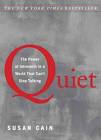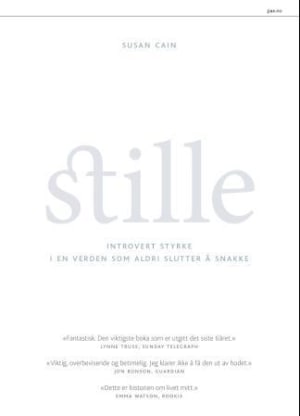Susan Cain has written an interesting book (“Quiet, the Power of Introverts in a World that Can’t Stop Talking”, Crown Publishing, 2012) which gave me an awakening to something I hadn’t really considered before and made me feel like I wasn’t the only one in the world who didn’t fit in. We live in a world where being an extrovert is considered the ideal, and yet it is not the extroverts who are the most innovative or creative. I’ve noticed this as a teacher – the pupil who talks all the time, is not the one who is the smartest in the class or the most knowledgeable. In fact, the pupil who talks a lot may have problems listening and learning new things, and unfortunately may distract other pupils in the class who would actually like to learn new things.
“Our lives are shaped as profoundly by personality as by gender or race. And the single most important aspect of personality — the ‘north and south of temperament’ as one scientist puts it — is where we fall on the introvert-extrovert spectrum. Our place on this continuum influences our choice of friends and mates, and how we make conversation, resolve differences, and show love. It affects the careers we choose and whether or not we succeed at them. It governs how likely we are to exercise, commit adultery, function well without sleep, learn from our mistakes, place big bets in the stock market, delay gratification, be a good leader, and ask ‘what if.’ ” (page 17)
The author continues to explain how especially the American world puts such an emphasis on being extrovert, that introverts will try to hide their own reality to feel part of the extrovert world.
What are some of the characteristics of an extrovert? “The archetypal extrovert prefers action to contemplation, risk-taking to heed-taking, certainty to doubt. He favors quick decisions, even at the risk of being wrong. She works well in teams and socializes in groups.” (page 19)
The ideal of the extrovert is seen in offices without walls, project work for everyone, high levels of stimulation and little time for introspection.
Susan Cain has many examples of introverts who have given us scientific theories, art work, literature and businesses. I enjoyed her storytelling and learning how introverts have contributed to our knowledge of how the world works.
If you are an introvert, which I definitely am, here are some of the characteristics according to Susan Cain:
- want less stimulation
- like time to themselves
- work slowly and deliberately
- like to focus on one task at a time
- can have mighty powers of concentration
- relatively immune to the lures of wealth and fame
- prefer to devote their social energies to close friends, colleagues and family
- listen more than they talk
- think before they speak
- express themselves better in writing than in conversation
- dislike conflict
- have a horror of small talk, but enjoy deep discussions
Does all of this sound like you? If it does, I recommend you read the book.

For those of you who like to watch videos, she gave a TedTalk in 2012: https://www.ted.com/talks/susan_cain_the_power_of_introverts
Boken har blitt oversatt til norsk, og heter “Stille – introvert styrke i en verden som aldri slutter å snakke”, utgitt av Pax forlag i 2013. Når vi lever i en verden der idealet er å snakke mye og være veldig utadvendt, det var veldig godt for meg å lese boken og få bekreftet at den typen jeg er, en “introvert”, er veldig utbredt. Forfatteren sier at en tredjedel til en halvparten av folket er introvert. Men det er mange som finner seg mellom ytre punktene og alle er litt annerledes.
Boken anbefales, særlig hvis du er en introvert.


One Reply to “Quiet”